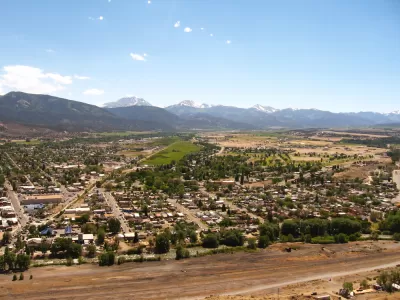In Colorado’s booming resort towns, even sleeping in your car has become an unaffordable luxury.

“Colorado’s widening kibosh on sleeping in vehicles adds to festering pain beneath the state’s recreation-oriented tourism and house-buying economic fervor,” writes Bruce Finley in the Denver Post. With homes selling for ten times as much as the local median income, workers who staff the popular lodging, restaurants, and other services that drive local economies find it increasingly hard to afford housing and must resort to sleeping in their cars. “The squeeze has intensified as the internet enables expanding commercial use of housing for short-term rentals and a COVID-19-era influx of well-to-do people fleeing dense-packed cities drives up prices.”
“Across mountainous western Colorado, cars as cocoons for sleep and sanity serve as last-resort shelters helping hundreds who provide services stay around.” To help provide a safe space for people living in cars, cities such as Salida have created designated parking zones that come with rules—and fees of as much as $300 a month. “These new accommodations have emerged as government-backed efforts to retain workers and also keep parking spaces free for visitors and well-to-do newcomers.” However, the town heavily enforces a ban on sleeping in cars on public property.
The programs have been criticized as a ‘band-aid’ solution to a much bigger problem, which will only be compounded by cold weather and an influx of winter workers.
FULL STORY: Colorado mountain towns lack affordable housing

Alabama: Trump Terminates Settlements for Black Communities Harmed By Raw Sewage
Trump deemed the landmark civil rights agreement “illegal DEI and environmental justice policy.”

Planetizen Federal Action Tracker
A weekly monitor of how Trump’s orders and actions are impacting planners and planning in America.

The 120 Year Old Tiny Home Villages That Sheltered San Francisco’s Earthquake Refugees
More than a century ago, San Francisco mobilized to house thousands of residents displaced by the 1906 earthquake. Could their strategy offer a model for the present?

In Both Crashes and Crime, Public Transportation is Far Safer than Driving
Contrary to popular assumptions, public transportation has far lower crash and crime rates than automobile travel. For safer communities, improve and encourage transit travel.

Report: Zoning Reforms Should Complement Nashville’s Ambitious Transit Plan
Without reform, restrictive zoning codes will limit the impact of the city’s planned transit expansion and could exclude some of the residents who depend on transit the most.

Judge Orders Release of Frozen IRA, IIJA Funding
The decision is a victory for environmental groups who charged that freezing funds for critical infrastructure and disaster response programs caused “real and irreparable harm” to communities.
Urban Design for Planners 1: Software Tools
This six-course series explores essential urban design concepts using open source software and equips planners with the tools they need to participate fully in the urban design process.
Planning for Universal Design
Learn the tools for implementing Universal Design in planning regulations.
Clanton & Associates, Inc.
Jessamine County Fiscal Court
Institute for Housing and Urban Development Studies (IHS)
City of Grandview
Harvard GSD Executive Education
Toledo-Lucas County Plan Commissions
Salt Lake City
NYU Wagner Graduate School of Public Service





























